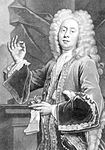| A Fool's Preferment | |
|---|---|
 | |
| Written by | Thomas D'Urfey |
| Date premiered | April 1688 |
| Place premiered | Dorset Garden Theatre, London |
| Original language | English |
| Genre | Restoration Comedy |
A Fool's Preferment; Or, The Three Dukes Of Dunstable is a 1688 comedy play by the English writer Thomas D'Urfey. It is a reworking of John Fletcher's Jacobean work The Noble Gentleman . It was first performed by the United Company at the Dorset Garden Theatre in London. Henry Purcell composed the play's incidental music. It was his first major work composing for the theatre in seven years since Sir Barnaby Whigg . [1]
The original cast featured James Nokes as Cocklebrain, Anthony Leigh as Justice, William Mountfort as Lyonel, Edward Kynaston as Clermont, George Powell as Longevile, John Bowman as Bewford, Thomas Jevon as Toby, Martin Powell as Usher and Elizabeth Boutell as Aurelia. [2]
